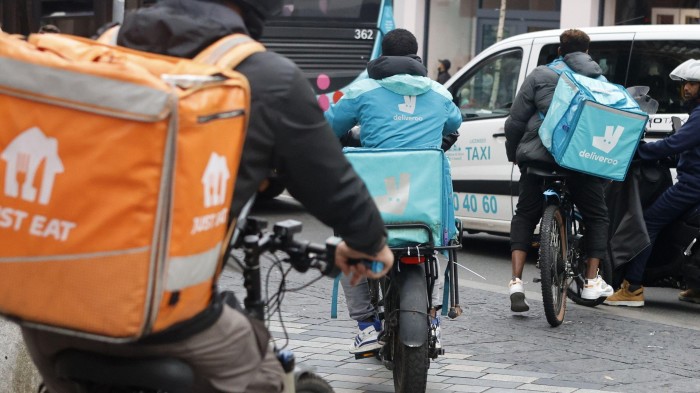Unlock the Editor’s Digest for free
Roula Khalaf, Editor of the FT, selects her favourite stories in this weekly newsletter.
Plans to force food delivery groups and other gig economy companies to check if those working for them are doing so illegally will reach the next stage on Wednesday as ministers launch a consultation on new laws.
The rules are being introduced after media reports earlier this year highlighted how large numbers of newly arrived migrants appeared to be working on a self-employed basis for food delivery services and other gig economy companies.
Companies offering work via online apps have not previously been obliged to enforce the UK’s strict right-to-work checks because they regard those working for them as self-employed contractors.
Home secretary Shabana Mahmood announced plans to start the consultation on Wednesday alongside details of a year-long programme of raids on premises suspected of employing workers illegally. The Home Office said 11,000 raids between October last year and September this year had resulted in 8,000 arrests.
Mahmood vowed to stamp out illegal working, which she said created an incentive for people to seek to reach the UK illegally.
“Those found to be illegally working in beauty salons, car washes and as delivery drivers will be arrested, detained and removed from this country,” she said. “I will do whatever it takes to secure Britain’s borders.”
The consultation is expected to seek details of how companies deal with those undertaking gig economy work on their behalf to ensure the process of making checks works smoothly and as intended. The new rules are set out in the border security, asylum and immigration bill, currently in the House of Lords.
The regulations will target people using their own accounts to seek work through gig economy apps and those working as substitutes for the account holders. Evidence has emerged showing that people with the right to work in the UK are often encouraged to lend out their account to someone without the right to work, to allow the illegal worker to circumvent any checks.
The UK Supreme Court in 2017 insisted services such as Deliveroo had to allow workers to offer substitutes as part of a court case examining whether gig economy workers should count as employees.
Government plans for a digital ID system are also meant to crack down on illegal working.
Most people awaiting asylum decisions are denied the right to work, unless they can show they have specific skills that are in shortage in the UK.
Employers found giving work to people without the right to do so could face up to five years’ imprisonment, fines of up to £60,000 per illegal worker or have their business closed.
A series of companies — including Uber Eats and Just Eat Takeaway, as well as Deliveroo — agreed a package of measures to tighten up on illegal working at a summit with government in July. As part of the agreement, the government also gave the companies the addresses of hotels for asylum seekers so they could check they were not giving work to people living at those addresses.




